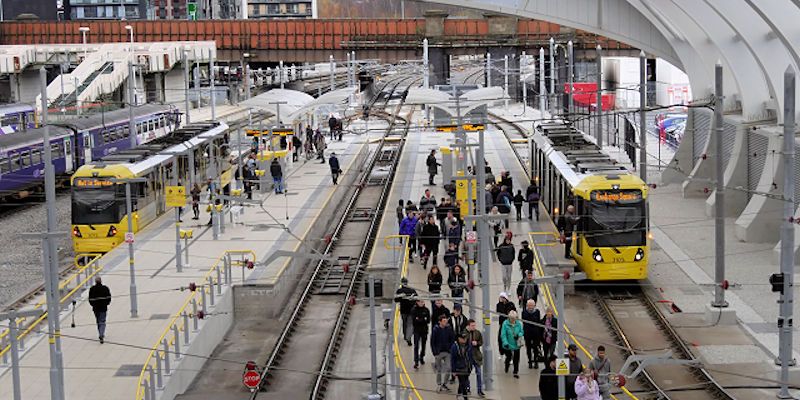
Policy brief 3, 17 Nov 2020. Katy Roelich, Greg Marsden.
Brief summary
Transforming infrastructure systems is essential to the UK’s sustainable development and net-zero commitments. Our research at the Priestley International Centre for Climate has shown that current decision making processes are unfit to deal with the multiple crises we face. New decision making approaches must be used that accommodate uncertainty, support collaborative decision making and incorporate the societal value of infrastructure.
Overview
- Current systems of governance and decision making are not capable of accommodating the uncertainty of challenges like Covid-19 and the climate crisis.
- New decision making methods are available and should be adopted by public sector decision makers, which can cope with uncertainty and involve multiple stakeholders.
- Collaborative decision making between sectors, departments, organisations, and the public is needed to improve the success and resilience of major infrastructure investments.
- Infrastructure needs to be considered as a provider of wellbeing, not just assessed in economic terms. Policy changes must enhance wellbeing.
Supporting decision makers
We have been working alongside local and national government to help move towards resilient net-zero infrastructure systems, and recently to recover from Covid-19.
- Dr Katy Roelich’s Multi Actor Adaptive Decision Making (MAADM) project is aiming to build flexibility into decisions that contribute to achieving a sustainable transport system, aligned with Greater Manchester’s goal to become carbon neutral by 2038.
- The Institute of Transport Studies has worked with the Local Government Association to produce a set of briefings on how to decarbonise transport.
- The Commission on Travel Demand brought together national and local government stakeholders, industry experts and academics to understand why travel demand trends are changing and could be changed, and what this means for future transport investment plans.
- Professor Greg Marsden is also leading on a major behavioural impacts study about the impacts of Covid-19 on travel behaviour both in the short and long-run.
We are developing new adaptive approaches that can allow decision makers to transform infrastructure systems, to tackle social deprivation and the climate crisis, whilst accommodating the deep uncertainty associated with the infrastructure system.
Dr Katy Roelich
Key findings
Covid-19 has highlighted the deep uncertainty associated with infrastructure decision making. Insights and techniques that we developed and successfully implemented to support Covid recovery can now be used to accommodate other uncertainties, like climate change, in decision making processes.
There are several ways to accommodate uncertainty in all stages of infrastructure decision making. The ‘Robust Decision Making’ method can be used quickly and qualitatively to build the tolerance of plans to deep uncertainties. Adaptive decision making can build flexibility into key policies whilst directing change towards a particular goal.
Our research has shown how these decision making approaches can be used in the public sector, and that they can be beneficial for national policy makers working across infrastructure.
This research has also shown the importance of infrastructure in providing societal value, as well as economic prosperity. Some assumptions about infrastructure’s impact on economic growth have been overestimated, and the societal value of certain services and modes, such as buses and walking, have been underestimated. Infrastructure’s positive impact on wellbeing was highlighted by Covid, but it is not fully accounted for in decision making processes.
Covid has reinforced existing fragmented governance structures and strategies – locking us in to certain types of sub-optimal response. This has clearly demonstrated the need to utilise new decision making approaches that are more collaborative and better at planning for the long-term.
Public awareness of infrastructure and its impact on daily life is increasing and their values should be accounted for in decision making processes. The MAADM project found that talking with the public about the link between infrastructure and wellbeing, and values underpinning perceptions, offers more opportunity to find areas of agreement between the public and decision makers.
National policy makers have a key role to play
Decisions affecting infrastructure transformation take place in myriad organisations across the public and private sector. National policy makers have a significant influence over how these decisions are made, through regulation, policy setting and formal guidance for appraisal and monitoring of decisions. It is crucial that national government processes are able to accommodate uncertainty and incorporate social value and that its regulation and guidance allows others to address this too.
Recommendations
- New decision making approaches are needed: Decision making methods that incorporate uncertainty are available now, are robust and adaptive, and can help policy makers to enable the required transformations to achieve resilient net-zero infrastructure.
- Collaborative decision making is key: Policy makers have a key role in facilitating this, through setting national strategies and by changing policy to make collaboration a requirement. The public should be part of decision making processes to ensure infrastructure addresses their needs.
- Value infrastructure socially, not just economically: Infrastructure needs to be considered as a provider of wellbeing, not just assessed in economic terms. The effect of infrastructure investment on economic growth in an era of growing digitisation needs to be revisited.
About the authors
- Katy Roelich leads the MAADM project which aims to build flexibility and participation into decision making, particularly with respect to resilient, net-zero infrastructure.
- Greg Marsden is Director of DecarboN8 – a network of local authorities, transport bodies, industry and universities across the North of England, which is creating a test bed for new initiatives to decarbonise transport.
Further information
This research was funded by EPSRC, UKRI, Transport Scotland, Transport for the North and Liverpool City Region.
Feature image: Manchester Victoria Station Metrolink Platforms, credit: David Dixon
To cite this policy brief, please reference: Roelich, K. and Marsden, G. (2020). Supporting decision making for resilient net-zero infrastructure. Brief 3, Policy Leeds, University of Leeds. https://doi.org/10.5518/100/64